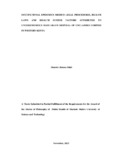| dc.description.abstract | In Kenya, Next of Kin may not find any transpired unclaimed or missing corpses, due to the skewed uptake of medicolegal procedures and health system factors. An increased uptake of health laws and propagated occupational epidemics,that influence infection prevention control measures,as primary prevention in western parts of Kenya.The negative impacts are mainly attributed to the limited and skewed existence of an integrated functional department of forensic sciences, which is centrally managed in a single command unit of the core disciplines of forensic medicine. Also, there is scarce utilization of quality behavioral knowledge, Attitudes, and practices among mortuary and forensic service providers to improve healthcare. Failure of national police services to rub in medicolegal procedures has instigated Public health officers and Resident Magistrates to exploit Health laws governing medicolegal procedures, mainly Public Health Act, CAP 242 and Local Government Act, CAP 265, to mediate improper unceremonious mass grave disposal, using affidavits and court orders for justice and accountability, as per Human Anatomy Act Cap 249 and Tissue Act Cap 252. Persistence congestions and overcrowding of unclaimed corpses continue to pose big challenges on propagated occupational epidemics, such as psychosocial, chemical, biological, ergonomic, and physical hazards and infectious diseases or conditions, such as Hepatitis, Cholera, Tuberculosis, and skin diseases.Yet, since independence,no studies in Kenya that have been done to mitigate,the occupational epidemics, medicolegal procedures, health laws & health system factors attributed to unceremonious mass grave disposal of unclaimed corpses by public mortuaries. Thus an infringement of the Human Bill of Rights. Therefore, the need, to determine occupational epidemics, medicolegal procedures, health laws, and health system factors,attributed to unceremonious mass grave disposal of unclaimed corpses by public mortuaries. Specifically,determine occupational epidemics;determine medicolegal procedures and health laws. Determine health system factors attributed to unceremonious mass grave disposal of unclaimed corpses, and establish how knowledge attitude $ practices, (KAP) of mortuary and forensic service providers influenced the study outcomes. Descriptive cross-sectional and cohort study designs were used in mixed research approaches of primary and secondary study populations. Active cluster purposive census, snowball, and Passive rapid retrospective desk reviews of unclaimed corpse records of the last 5 years were exploited sampling techniques. Instruments and tools used were semi-structured questionnaires, retrospective desk review forms,Key Informant Interviews, (KIIs), Focus Group discussions, (FGDs), and observation guides. Data management was by excel and SPSS version 26, to outline descriptive, frequency analyzes and statistical inferences. Odds ratio (OR) and relative risks (RR), established attributable exposure risks. Qualitative data were analyzed by categorization of Sub-themes and triangulations of verbatim. In this study, there is No occupational epidemics, but majority (66%) of mortuary and forensic service providers were affected by psychosocial hazards with RR of (0.59,0.17), OR (0.58) from the society. From the 3908 unclaimed corpses admitted in the last 5 years. 3030 were adults, and 878 were the law's neglected minor cohorts. 42% (1273), adult unclaimed corpses, were improperly unceremoniously mass graved using court orders, of which 89% were adult males and 11% were females. Uptake of quality fingerprints & DNA appraisals was only 0.051%, with attributable risks of RR (1.0, 0.97), and OR (0.97) of the national police service failure to implement. Still, only 41% autopsies, were dissected on previously unclaimed corpses. Likewise, 83% of mortuary and forensic service providers had skewed KAP on quality mortuary and forensic management. But, most PHOs, 85% had appropriate technologies on health laws uptakes, besides scarce quality behavioural KAP on uptake of medicolegal procedures and proper forensic unceremonious mass grave disposal in public cemeteries. Thus, need for holistic and comprehensive Policy amendmenton on mortuary and integrated forensic management by GOK to mediate persistent improper unceremonious mass grave disposal of unclaimed corpses by construction of ultra modern DNA plant and also ennable integrated forensic sciences Departments under one command management as a mitigation measure to the study ou | en_US |

